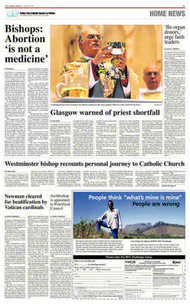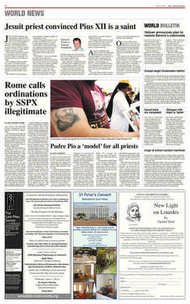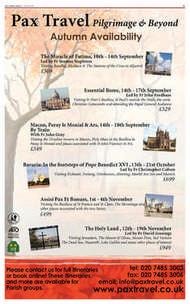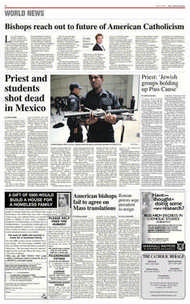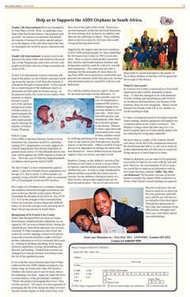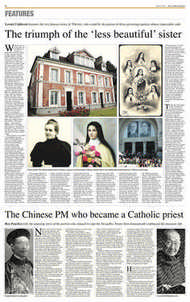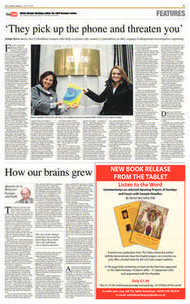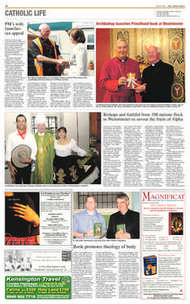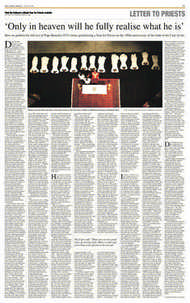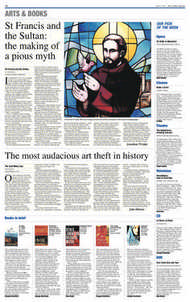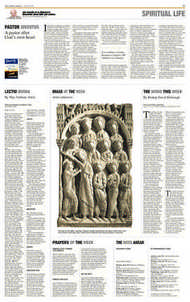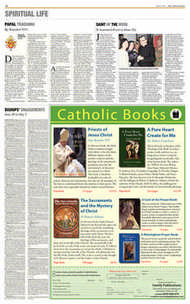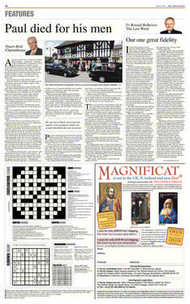Page 15, 26th June 2009
Page 15

Report an error
Noticed an error on this page?If you've noticed an error in this article please click here to report it.
Tags
Share
Related articles
Charterhouse Chronicle
By Mgr. Gordon Wheeler
New Line In Curran Defence
Revolting Nuns With Strident Fervour
Now Stephen Hawking Joins The New Atheists
Saving Mohamed
The American university is a novelist’s nightmare
BY MARK McGURL
ow do you teach someone to write? The late John Hawkes would give his students wine in class and focus his attention on the pretty girls. Hanif Kureshi claims he gives every student the exact same mark – 71 per cent – and writes reports saying his students were wellbehaved and well-dressed. The late Donald Barthelme would call his students in the early hours to check how their stories were coming along. And Saul Bellow, it has been claimed by former students, would sit with his thumb pressed to his temple, like a man rehearsing suicide, before grumbling about his marriages and the alimony he paid his former wives.
Teaching creative writing can be dangerous too. Many novelists have experienced long periods of writer’s block after taking an academic position, and those who haven’t have often produced campus novels – Michael Chabon’s Wonder Boys, Richard Powers’ Galatea 2.2, Michael Collins’s The Secret Life of Robert E Pendleton – about blocked or dangerously deluded authors.
It is somewhat surprising then to discover that the first full-length academic study to detail the relationship between novelists and universities. Mark McGurl’s The Program Era: Postwar Fiction and the Rise of Creative Writing takes the perspective that the rise of the creative writing programme stands as the most important event in postwar American literary history.
McGurl is, in fact, so keen to establish American universities as a central factor in American literary output that he even tries to sweep in authors who have fiercely resisted this sort of patronage. He reaches to include Don DeLillo, John Updike and Cormac McCarthy, first by making it sound like their sources of income (book sales, the healthy perword rates of the New Yorker, and the largesse of non-academic institutions like the Guggenheim Foundation) are somehow undignified or down to luck. Then McGurl reminds the reader that these authors all went to university, even if they didn’t study creative writing, and that McCarthy got his start publishing stories in the University of Tennessee’s literary magazine.
Such an undignified stretch seems unnecessary given just how many important American authors have taught creative writing, but McGurl wants to see the whole of the literary culture of the second half of the 20th century as made up of nothing but campus novels. He also wants to write about the authors he likes, beginning with Nabokov and his urge to construct Harold Bloomstyle canons and chains of influence detract from an otherwise fascinating and (at times) beautifully argued book.
One of the first novels he focuses on is John Barth’s Giles Goat-Boy, and although the reputation of this author, this book and his literary school (post-modernism) has sadly diminished, it remains as prescient a novel as ever. In fact, the university in this novel, which has an allpowerful computer system that sires a goat-boy and students who spend their time studying submarines and ice cream is fairly similar to the university where I teach creative writing to students who could’ve elected to study digital games, exploitation films or quality American television instead (and that’s just the School of Arts.) Another of McGurl’s sleights-ofhand is to re-classify post-modernist fiction as “technomodernism”, one of what he describes as three “relatively discrete but in practice overlapping aesthetic formations.” “Technomodernism”, argues McGurl, is best understood as a tweaking of the term “postmodernism” in that it emphasises the all-important engagement of postmodern literature with information technology. McGurl’s other two aesthetic formations are “high cultural pluralism” – fiction that joins the high literary values of modernism with a fascination with the experience of cultural difference and the authenticity of the ethnic voice – and “lower-middle-class modernism”.
These distinctions, while a useful taxonomy of the kind of fiction produced by students and their writer-teachers on creative writing courses, seem reductive; a way of reducing the intellectual developments and new openings that have radically revived the contemporary novel over the last 40 years. I would also argue that rather than being allimportant, the engagement of postmodernist literature with information technology has leeched much of the fun out of Barth and co’s fictional experimentation, resulting in bland, middlebrow novels such as The Corrections that replace an antic sense of fun with a dull worthiness.
Where The Program Era works best is in its exploration of the literary history behind three common creative writing saws – “write what you know”, “show, don’t tell” and “find your voice”. Beginning with Thomas Wolfe’s Look Homeward, Angel, he explores how literary fiction has always had its roots in lived experience, dismissing genre fiction as “telling of outlaws, detec tives, vampires, moon men, and other things the writer has probably never seen”. He is also good on Flannery O’Connor, exploring how her devout Catholicism allowed her to deride the authority of “worldly liberal institutions” like universities. McGurl devotes much of the first part of his book to the famous Iowa writers’ programme (which O’Connor attended).
The latter sections are mostly fascinating and introduced me to many forgotten or unfairly neglected authors whose books I will seek out, as well as provocatively repositioning unlikely authors such as Raymond Carver as academic intellectuals, but nothing here is quite as compelling as the recurring nightmare suffered by the poet Paul Engle.
Engle was the director of the Iowa Writers’ Workshop for over 25 years and once described by Kurt Vonnegut as “the single most helpful writer to other writers in human history”. In the nightmare, which he confessed to a crowd at a party for visiting luminary Robert Penn Warren, Engle described being imprisoned in a concentration camp. While there, the guards make him undress, bend over and grab his ankles then climb around a series of indentations in the camp’s outer wall, like some kind of naked fly. At first the guards and prisoners jeer at him, but after a while he finds he can do this surprisingly well. In time, he whizzes around the wall while the guards and prisoners look on with amazement and admiration.
I know exactly how he feels.
blog comments powered by Disqus




